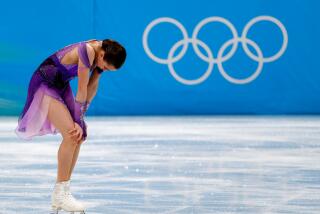Effective testing for HGH not expected any time soon
- Share via
After three years and at least $450,000 from Major League Baseball and the NFL, scientists are no closer to finding a urine-based test that can reliably detect the banned, brawn-building human growth hormone.
Even more troubling is the fact that, despite testers’ optimism over last week’s news that a single positive blood sample snared a British rugby player for HGH, there are questions about why hundreds of other athletes are suspected of having skirted detection in the same procedure.
Complicating matters, the two men who many believe will eventually find the solution to indisputable testing — Don Catlin and Lance Liotta — haven’t spoken to each other in months, though each continues to work on the problem.
In fact, as authorities for MLB, the NFL, the U.S. Olympic Committee and the U.S. Anti-Doping Agency gather Thursday in New York for a Partnership on Clean Competition meeting, the state of HGH testing is now being assessed by some as a riddle that may not have an answer.
Asked how long he expects it to take scientists to create a urine test for HGH that will placate the MLB and NFL players’ unions reluctant to subject their athletes to blood draws, the head of the World Anti-Doping Agency admitted he didn’t know.
“That’s like asking how long is a piece of string,” WADA’s Director General David Howman said. “These scientists are trying to create a test for something with no scientific history.
“This could be like barking up a tree that has no top.”
Catlin, the veteran anti-doping authority who has presided over drug testing at the Olympics for more than 20 years, was given three years of $150,000 grants by Major League Baseball and the NFL to explore a possible urine test for HGH.
In the fall, the journal “Drug Testing and Analysis” published a paper in which Catlin revealed that his HGH isoform ratio test, which had been deployed at three Olympic Games, hadn’t generated a positive test, with scientists admitting the amount of HGH in urine was too minimal for them to produce a verifiable test. One expert reports that HGH found in urine is 1,000 times lower than the volume found in blood.
“We need to find another way,” said Catlin, who heads the Anti-Doping Research lab in Los Angeles. “The amount of growth hormone in urine is much lower than we ever thought it’d be.”
Catlin is pursuing the use of antibody-like aptamers, which attach to HGH in samples and would allow testers to detect the substance’s use.
There’s also work being done by George Mason University professor Liotta, who attended an HGH summit with Catlin in Beverly Hills in November 2008. Then, baseball officials told The Times that a Catlin-Liotta collaboration would be “at the front of the line” to win grants from a pool of $10 million for research.
Catlin said Liotta has “stopped communicating with me” for unknown reasons. Catlin said he’s aware Liotta is pursuing a test that would rely on measuring concentrated levels of HGH in urine.
In an e-mail to The Times, Liotta said he is currently working to measure normal HGH baseline levels in college-age adults, and will “publish our findings.”
“Whether our scientific baseline information of HGH in normal subjects’ urine is used as part of a routine urine test is a question for other experts in the field of anti-doping,” Liotta wrote.
There is money available to keep the research going. The Partnership for Clean Competition is sitting on a $3-million annual coffer to explore “the science that will protect the clean athletes,” U.S. Anti-Doping Agency head Travis Tygart said.
Tygart said Liotta has already gotten “some of the research money.”
Catlin is undeterred.
“I believe my way is the way to go,” he said, adding that he ultimately plans to seek grant funding. “But maybe Dr. Liotta’s way is even better. There will be arguments.
“Nothing’s ever perfectly clear,” he said. “It’s a complicated situation.”
Not everyone agrees.
Even though the MLB and NFL unions are balking at random blood samples, WADA’s Howman said U.S. sports leagues should invest in perfecting the blood testing.
“If people want to throw a lot of money at urine, that’s their right,” Howman said. “I’d rather go after something that’s not pie in the sky, something where the science has already been proven. Why go that other way? Just because of this nonsense about blood testing being invasive? Taking this [small] amount of blood does not cause the athlete any concern.”
But Catlin is among those who question how well the blood test is working.
For one thing, Terry Newton, the British rugby player, chose to confess after a blood test employed by the United Kingdom Anti-Doping Agency found elevated levels of the substance in his system.
Yet despite 1,000 blood tests for HGH that have been performed globally, Newton’s result is the only positive in the bank. That kind of ratio calls into question the 2008 HGH summit testimony like that of Dr. Richard I.G. Holt of England’s University of Southampton, who said the substance “is widely used by athletes.”
Newton’s result “had to have been a targeted test, reliant on inside information,” Catlin said. “But now the professionals in this country are faced with this positive. What are they to do? Implement blood tests? Invest more in intelligence? Do the urine tests?”
Asked how long it would take for a urine test for HGH to be available to international testers, Catlin speculated, “Two years. Nothing is ever fast.”
More to Read
Go beyond the scoreboard
Get the latest on L.A.'s teams in the daily Sports Report newsletter.
You may occasionally receive promotional content from the Los Angeles Times.






